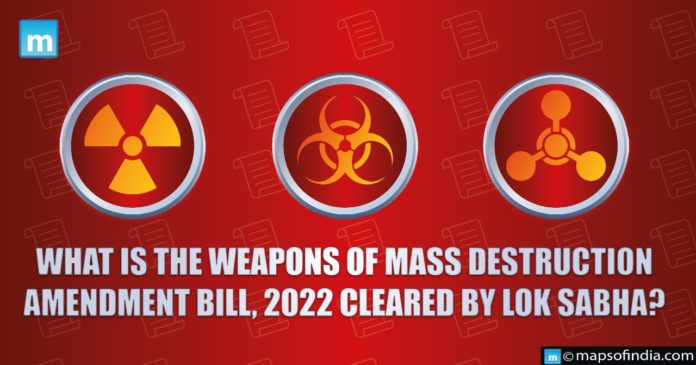On Wednesday, Lok Sabha passed yet another bill that prohibits the funding of weapons of mass destruction (WMDs). The Weapons of Mass Destruction and their Delivery Systems (Prohibition of Unlawful Activities) Amendment Bill 2022 was passed unanimously in the lower house (Lok Sabha) of the Parliament.
What are WMDs?
The weapon of mass destruction (WMDs), as it is known, is something that can inflict mass casualties and destroy nations. The WMDs can be used in four ways to cause devastation: Chemically, Biologically, Nuclear, and Radiologically.
What countries possess this deadly weapon or WMD?
Out of 193, there are nine countries with an arsenal of WMDs. According to the World Population review, here is a list of countries with WMDs and their inventory:
- Russia’s (1458) active WMDs
- The United States of America (1389) has active WMDs.
- China with (350) WMDs and is currently expanding
- France (290)
- United Kingdom (225)
- Pakistan (165)
- India with (156)
- Israel (90)
- North Korea (40-50)
Have the WMDs ever been used?
Yes, the Germans recorded the first use ever of this deadly weapon in 1915, during which they attacked the village Langemarck with mustard gas.
Later, the United States dropped the nuclear weapon over two Japanese cities of Hiroshima and Nagasaki during World War II in 1945.
What amendments are made to the WMD bill?
The External Affairs Minister(EMA), Dr S.Jaishankar, introduced the bill. India already has a bill that was passed on June 6, 2005. This bill mentions how the Indian government will not tolerate any activity regarding the passing or transportation of any material or technology used in WMD on its soil. However, this time the bill needed more amendments to make provisions opposed to ‘the financing of proliferation of weapons of Mass destruction and their delivery system’.
The bill passed authorizes the Central government to seize or freeze and attach financial assets of individuals who are engaging in such activities.
While addressing the Lok Sabha, the EMA emphasized the importance of amending the bill and the recommendations made by the Financial Action Task Force. He said, “We are upgrading a law which is 17 years old, which like other legislations need updating…FATF needs a specific reference to financing…the bill is meant to be an amendment to a shortcoming, something which is missing in current law. It is not meant to be a new law”.
What are the international laws against the use of WMDs?
Various treaties and agreements have been signed between countries that possess these weapons. The main objective of these treaties is to ban chemical and biological weapons. For example, the Geneva 1925 Protocol prohibits chemical and biological weapons during a war.
Another treaty signed in 1972, the agreement is known as the Biological and Toxin Weapons Convention. The treaty talks about disarmament, which means reducing or completely giving up the current stockpile of biological weapons.





